The story originally appeared on A Teacher Like You.
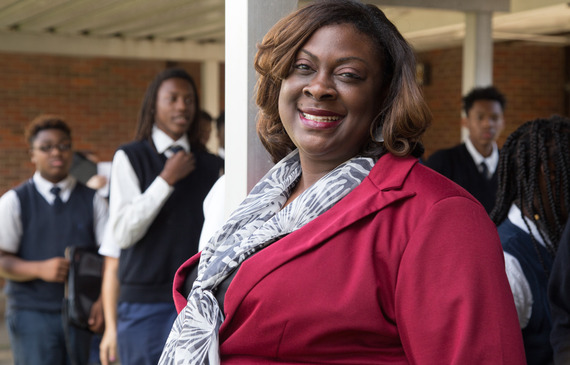
We get so caught up in testing that we're forgetting to nurture kids. We forget that school isn't just a place to learn, but a place to grow and become a person. That person in charge of that classroom, who kids are looking up to, needs to be a nurturer and a caregiver, a counselor and a relationship guru. This person is everything to these kids, because they may never have had someone like that in their lives.
There's teaching, and then there's teaching.
"At the beginning of my career, I thought I was teaching -- but it wasn't until I got to where I am now that I really knew what teaching meant. I spent years teaching high school honors classes to 11th graders, but after seven years, I wanted a change. I was wearing so many hats, and I just thought it was time to do something different.
One day, I ran into a former principal, and he told me about a brand new program they were bringing to Mobile County -- an early intervention for at-risk 8th and 9th graders who show signs of dropping out. It was a big deal to move from 11th to 8th grade, but I wanted to give it a try. The majority of the kids are actually 14-16 years old, which means they really should be a couple grades ahead but have fallen behind.
It wasn't until I got to teach these kids -- with these different backgrounds and these stories -- that might need a little extra help that I really felt like I became a teacher. These kids come from broken homes, from lower-socioeconomic backgrounds or from families that don't speak English -- and they really are 'at-risk' of leaving school. To even just get them back on track and wanting to finish school has been the most rewarding."
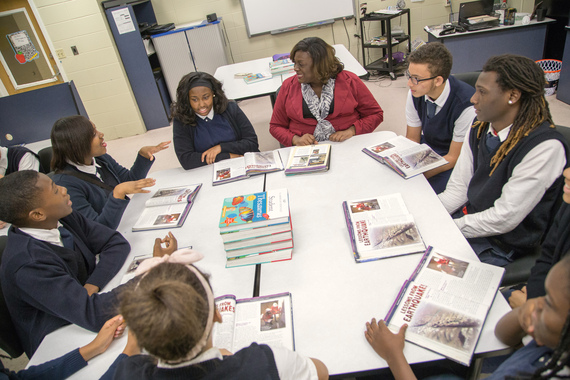
We all have hurdles.
"When people hear 'at-risk,' they think it means the students have behavioral problems. And I'll admit it: that's what I thought too, because that's what we're trained to think. But at-risk students are just students who might drop out. I have the same variety of students you'd have in a regular classroom: some extremely smart or even gifted students and some who may not read as well because of the same situations that put them in this program in the first place. They don't have rap sheets or probation officers. They're just everyday kids who want a chance to get back on track and graduate.
But that reputation bothers me to the core. At our school, our kids all dress professionally -- they all wear ties, navy pants, and sweater vests. When you tell people that they have this label, people don't believe it. We actually recruit these kids; we have to convince their parents to let them come to our school. They're under the assumption that it's for 'bad kids,' but that's not who we are. To mislabel anyone's child is unfair, but to mislabel these students is so frustrating. Just because they're behind doesn't mean they're bad or dumb. They had a challenge and a hurdle in life, and they haven't gotten around it. But that's our job -- to teach them to jump over those hurdles and get back on track."
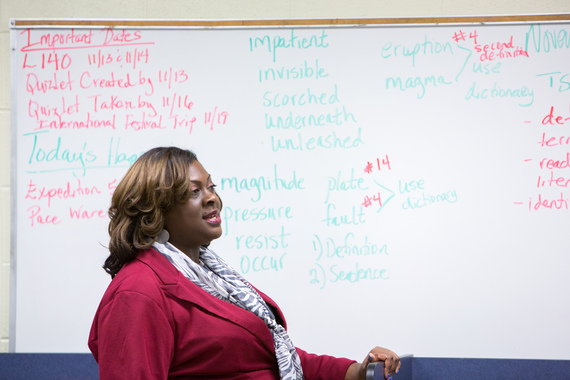
The new stars of the show.
"A lot of the time, when a child is considered at-risk, one of the reasons is that they might not be considered the brightest or the best or the most important of the group. They might not be on the honor roll or their parents aren't around as much. They're average students, and I think that, sometimes, we forget that everyone's child matters. These are kids who aren't used to hearing that they did a good job, or even being asked what they're doing this weekend or whether they changed their hair. They don't get a lot of attention.
My son is actually now in the program. To me, he's always been a great student, but he would always come home and tell me how much he hated going to honors assemblies because they forgot about the average kids. That does happen -- we forget the ones at mid-level. We celebrate everyone and teach them to love themselves, but I think sometimes we forget to stop and look at these kids.
I've always made it my goal to get to know the students, no matter what. But at this school, with these kids, you have no choice. You have to learn who they are and understand their story. It helps that we cap our classroom numbers at 20. We've had so many kids in the past who've come through, shy and hiding in the back. In a classroom of 40, they'd get overlooked; not on purpose, but just because it happens. As a teacher, you don't want to worry that Johnny won't sit down, because you have 38 other kids who have to take the same test -- and your name is attached to these kids, so if they don't pass, you look like a bad teacher. The reality is, Johnny just can't learn the way that others can.
The shyer kids or the reluctant learners (and those are considered at risk!), the ones who live in foster care, the ones who've dealt with the death of a parent -- they're the ones that might hide in the back of the class. But here, they're the stars of the show. I'm really able to interact with them and get to know them on an academic and personal level. Our success comes from a smaller, more nurturing environment, where you know your teachers. It makes a difference, knowing you care."
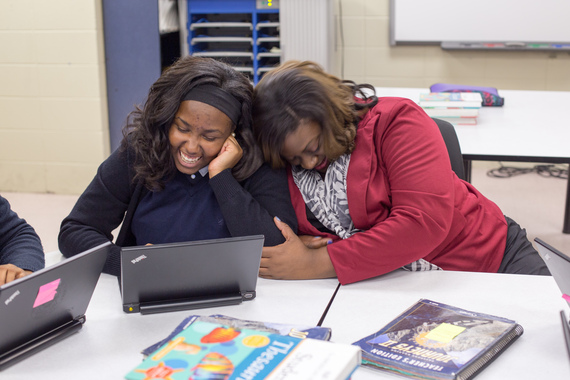
Being Momma Rivers.
"In the United States, we have a law called 'In Loco Parentis.' It's Latin for 'In Place of the Parent.' So when the kids are here, they're my babies -- and I'm going to treat them like a momma would. I'll discipline them when they need it, and protect them when they need it too. They know that I love them just like they're my very own.
I think sometimes teachers can be scared to form that bond. They're scared to touch. But to me, all my kids are 'sweethearts,' 'honey,' 'sugar,' 'cupcake.' They need to know that someone thinks they're sweet. We get so caught up in this world of testing that we're forgetting to nurture kids. We forget that school isn't just a place to learn, but a place to grow and become a person. The person in charge of that classroom, who they're looking up to, needs to be a nurturer and a caregiver, a counselor and a relationship guru. They're everything to these kids, because they may have never had someone like that in their lives.
For so long, I had been working with kids who I knew were going to be OK. And here I am with these kids who need a little bit extra. It was so easy to teach the kids who are going to go to college, or who are going to graduate in the top ten. But to reach a child who had just been another number to a counselor, it's just amazing."
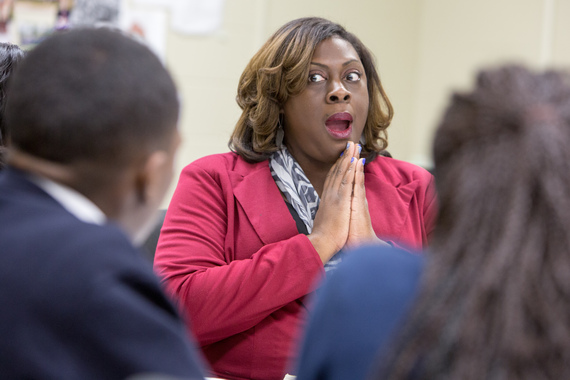

We get so caught up in testing that we're forgetting to nurture kids. We forget that school isn't just a place to learn, but a place to grow and become a person. That person in charge of that classroom, who kids are looking up to, needs to be a nurturer and a caregiver, a counselor and a relationship guru. This person is everything to these kids, because they may never have had someone like that in their lives.
There's teaching, and then there's teaching.
"At the beginning of my career, I thought I was teaching -- but it wasn't until I got to where I am now that I really knew what teaching meant. I spent years teaching high school honors classes to 11th graders, but after seven years, I wanted a change. I was wearing so many hats, and I just thought it was time to do something different.
One day, I ran into a former principal, and he told me about a brand new program they were bringing to Mobile County -- an early intervention for at-risk 8th and 9th graders who show signs of dropping out. It was a big deal to move from 11th to 8th grade, but I wanted to give it a try. The majority of the kids are actually 14-16 years old, which means they really should be a couple grades ahead but have fallen behind.
It wasn't until I got to teach these kids -- with these different backgrounds and these stories -- that might need a little extra help that I really felt like I became a teacher. These kids come from broken homes, from lower-socioeconomic backgrounds or from families that don't speak English -- and they really are 'at-risk' of leaving school. To even just get them back on track and wanting to finish school has been the most rewarding."

We all have hurdles.
"When people hear 'at-risk,' they think it means the students have behavioral problems. And I'll admit it: that's what I thought too, because that's what we're trained to think. But at-risk students are just students who might drop out. I have the same variety of students you'd have in a regular classroom: some extremely smart or even gifted students and some who may not read as well because of the same situations that put them in this program in the first place. They don't have rap sheets or probation officers. They're just everyday kids who want a chance to get back on track and graduate.
But that reputation bothers me to the core. At our school, our kids all dress professionally -- they all wear ties, navy pants, and sweater vests. When you tell people that they have this label, people don't believe it. We actually recruit these kids; we have to convince their parents to let them come to our school. They're under the assumption that it's for 'bad kids,' but that's not who we are. To mislabel anyone's child is unfair, but to mislabel these students is so frustrating. Just because they're behind doesn't mean they're bad or dumb. They had a challenge and a hurdle in life, and they haven't gotten around it. But that's our job -- to teach them to jump over those hurdles and get back on track."

The new stars of the show.
"A lot of the time, when a child is considered at-risk, one of the reasons is that they might not be considered the brightest or the best or the most important of the group. They might not be on the honor roll or their parents aren't around as much. They're average students, and I think that, sometimes, we forget that everyone's child matters. These are kids who aren't used to hearing that they did a good job, or even being asked what they're doing this weekend or whether they changed their hair. They don't get a lot of attention.
My son is actually now in the program. To me, he's always been a great student, but he would always come home and tell me how much he hated going to honors assemblies because they forgot about the average kids. That does happen -- we forget the ones at mid-level. We celebrate everyone and teach them to love themselves, but I think sometimes we forget to stop and look at these kids.
I've always made it my goal to get to know the students, no matter what. But at this school, with these kids, you have no choice. You have to learn who they are and understand their story. It helps that we cap our classroom numbers at 20. We've had so many kids in the past who've come through, shy and hiding in the back. In a classroom of 40, they'd get overlooked; not on purpose, but just because it happens. As a teacher, you don't want to worry that Johnny won't sit down, because you have 38 other kids who have to take the same test -- and your name is attached to these kids, so if they don't pass, you look like a bad teacher. The reality is, Johnny just can't learn the way that others can.
The shyer kids or the reluctant learners (and those are considered at risk!), the ones who live in foster care, the ones who've dealt with the death of a parent -- they're the ones that might hide in the back of the class. But here, they're the stars of the show. I'm really able to interact with them and get to know them on an academic and personal level. Our success comes from a smaller, more nurturing environment, where you know your teachers. It makes a difference, knowing you care."

Being Momma Rivers.
"In the United States, we have a law called 'In Loco Parentis.' It's Latin for 'In Place of the Parent.' So when the kids are here, they're my babies -- and I'm going to treat them like a momma would. I'll discipline them when they need it, and protect them when they need it too. They know that I love them just like they're my very own.
I think sometimes teachers can be scared to form that bond. They're scared to touch. But to me, all my kids are 'sweethearts,' 'honey,' 'sugar,' 'cupcake.' They need to know that someone thinks they're sweet. We get so caught up in this world of testing that we're forgetting to nurture kids. We forget that school isn't just a place to learn, but a place to grow and become a person. The person in charge of that classroom, who they're looking up to, needs to be a nurturer and a caregiver, a counselor and a relationship guru. They're everything to these kids, because they may have never had someone like that in their lives.
For so long, I had been working with kids who I knew were going to be OK. And here I am with these kids who need a little bit extra. It was so easy to teach the kids who are going to go to college, or who are going to graduate in the top ten. But to reach a child who had just been another number to a counselor, it's just amazing."

No comments:
Post a Comment